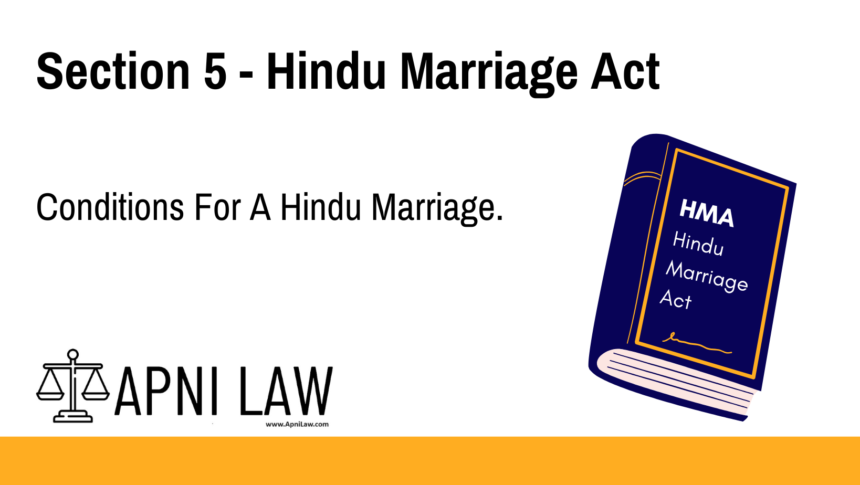Code: Section 5 of the Hindu Marriage Act, 1955
Conditions for a Hindu marriage.—A marriage may be solemnized between any two Hindus, if the following conditions are fulfilled, namely:—
(i) neither party has a spouse living at the time of the marriage;
(ii) at the time of the marriage, neither party—
(a) is incapable of giving a valid consent to it in consequence of unsoundness of mind; or
(b) though capable of giving a valid consent, has been suffering from mental disorder of such a kind or to such an extent as to be unfit for marriage and the procreation of children; or
(c) has been subject to recurrent attacks of insanity;
(iii) the bridegroom has completed the age of twenty-one years and the bride, the age of eighteen years at the time of the marriage;
(iv) the parties are not within the degrees of prohibited relationship unless the custom or usage governing each of them permits of a marriage between the two;
(v) the parties are not sapindas of each other, unless the custom or usage governing each of them permits of a marriage between the two.
—
Explanation of Section 5 – Legal Requirements for a Hindu Marriage
Section 5 outlines the basic legal conditions that must be met for a Hindu marriage to be valid under the law. If even one condition is not fulfilled, the marriage could be void or voidable.
Let’s break down each condition clearly.
1. Monogamy: No Existing Spouse
The law forbids bigamy. At the time of marriage, neither party should have a living spouse. If someone marries while still legally married to another person, the second marriage is considered void.
Example: If a man already has a living wife and marries again without a legal divorce, the second marriage is not valid under the Hindu Marriage Act.
2. Mental Fitness and Consent
Marriage requires a sound mind and ability to consent. The law prohibits marriage if either party:
- Cannot give valid consent due to unsoundness of mind
- Has a serious mental disorder that makes them unfit for marriage or childbearing
- Has frequent episodes of insanity
This ensures both parties can understand and willingly enter into the marriage.
3. Legal Age for Marriage
The minimum legal age is:
- 21 years for the groom
- 18 years for the bride
Any marriage involving parties younger than the legal age is considered illegal, though it may be voidable rather than automatically void.
Note: Child marriages are punishable under separate laws even if they are not immediately invalid under the Act.
4. No Prohibited Relationships
The couple must not be related within the “degrees of prohibited relationship” as defined in Section 3(f) of the Act. This includes:
- Lineal ascendants and descendants
- Siblings
- Uncle-niece or aunt-nephew relationships
However, if both parties belong to communities where such relationships are allowed by long-standing custom, the marriage can be valid.
5. No Sapinda Relationship
The bride and groom must not be sapindas of each other unless custom permits it. Sapinda relationships extend:
- Up to 3 generations on the mother’s side
- Up to 5 generations on the father’s side
The aim is to prevent close blood-relative marriages.
—
Illustrations: Examples of Valid and Invalid Marriages
Example 1:
A 25-year-old man and a 19-year-old woman decide to marry. Both are single, mentally fit, and not related by blood. This marriage meets all the conditions under Section 5 and is valid.
Example 2:
A man with a living spouse remarries without divorcing the first wife. This second marriage is void under the Hindu Marriage Act.
Example 3:
A woman with a history of severe mental illness that prevents her from understanding the concept of marriage gets married. This marriage could be declared voidable.
Example 4:
Two people from a tribe that permits marriage between cousins (a prohibited relationship under general law) marry each other. If their community custom supports it, the marriage is valid under the Act.
—
Common Questions and Answers on Section 5
Q1: Can someone with a past mental health issue get married?
A: Yes, if they can give valid consent and are mentally fit at the time of marriage. Only serious or recurring mental illnesses that affect marital life disqualify a person.
Q2: Is child marriage automatically void under the Hindu Marriage Act?
A: No, it is voidable—not void. That means the marriage is valid unless one party challenges it. However, under the Prohibition of Child Marriage Act, 2006, child marriages are punishable and can be annulled.
Q3: What if the parties are sapindas but their community allows it?
A: If a well-established custom or usage permits sapinda marriages within that community, the marriage is valid under Section 5.
Q4: Is a second marriage legal if the first spouse is missing?
A: No, unless the person has been legally declared dead or divorced by a court, the second marriage is void.
—
Conclusion
Section 5 of the Hindu Marriage Act lays down the legal foundation for a valid Hindu marriage. It protects individuals from forced, child, or mentally unfit marriages and prevents unions between close relatives. These rules ensure the institution of marriage remains respectful, fair, and legally sound.
For more legally accurate insights into Hindu law, visit ApniLaw.









